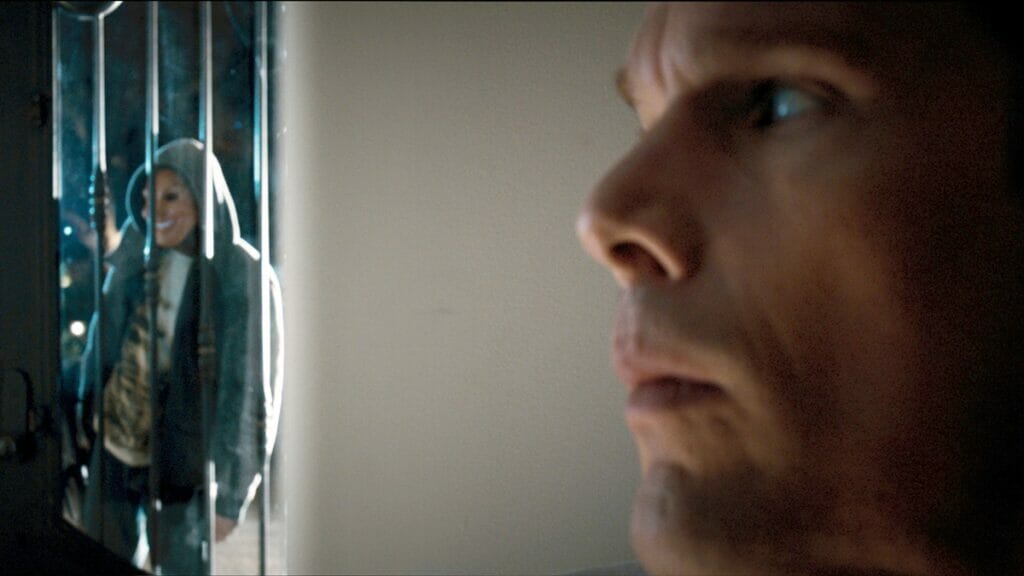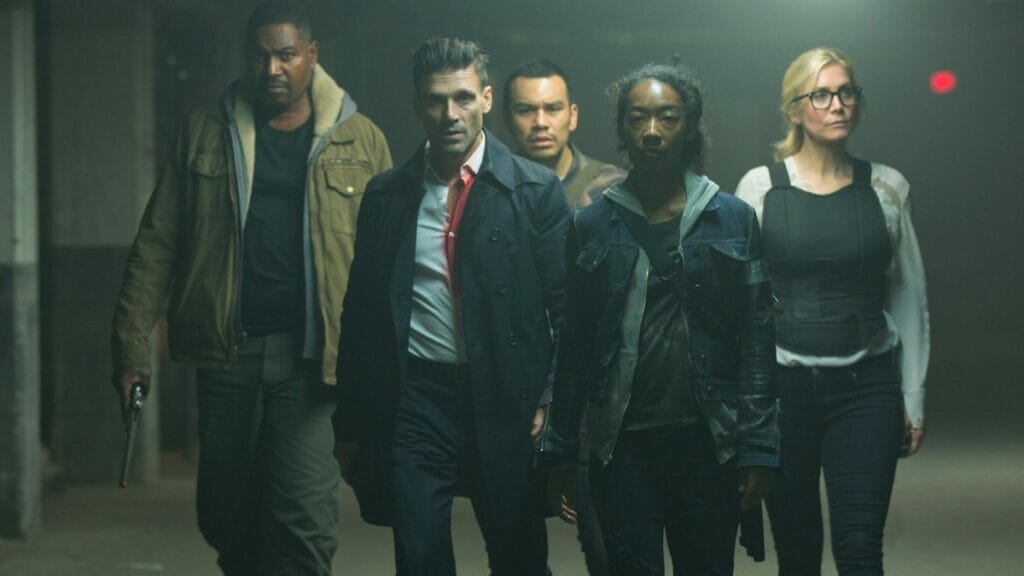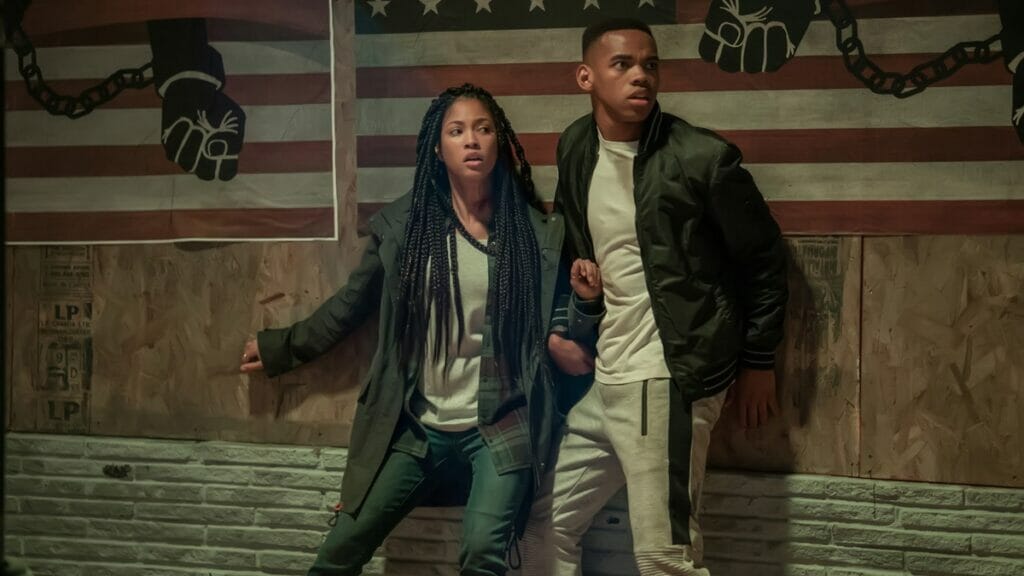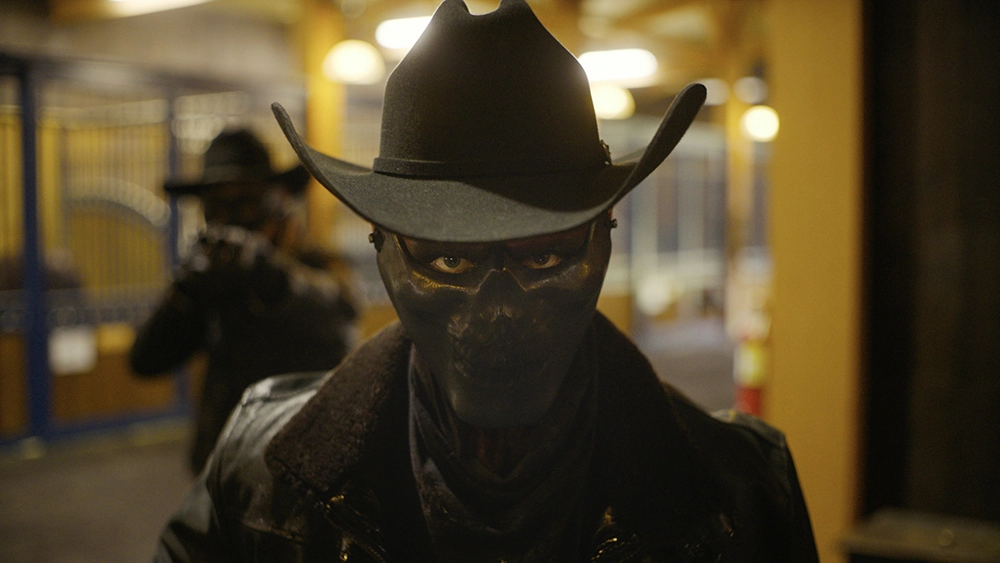The dystopian portrait of the United States now feels ironically naïve, a reality that makes it more deeply unnerving than when it first hit theatres.
When The Purge film series began, it attempted to create a heightened, ultraviolent version of the future that was both laughably over-the-top and an accurate reflection of the current political climes. They created a dystopia that was vaguely familiar but could still leave you rolling your eyes at its implausibility. For those unfamiliar with the franchise, the concept is as follows: On one night each year, the US government legalizes all crime, including murder, in the hopes of providing an outlet for Americans’ rage. It ultimately leads to an overall decrease in crime and an (ostensibly) utopian society.
But over time, the series has become a fascinating lens through which to view a specific kind of Obama-era optimism, and the way that optimism would ultimately be broken by the 2016 election.
The Purge was released in 2013, at the dawning of Obama’s second term, and it was easy for a certain kind of white, liberal voter to believe things would only keep getting better. It was a period of time where it felt possible to believe that sure, America was tumultuous, we always have been, but we’d never actually undo any of our progress! We were going to keep marching forward! Only this rose-colored point of view could have produced The Purge, because The Purge doesn’t believe the future it imagines is actually possible.
How can we engage with the [Purge] franchise today when watching it only reminds us that what we’ve actually become is so much worse?
More bizarrely, the “distant future” the first film looks to is 2022, which means we’re now, temporally, on the other side of history from the one fictional nightmare franchise creator James DeMonaco dreamed up. And arguably, what America did during the pandemic is even more horrifying.
How, then, can we engage with the franchise today when watching it only reminds us that what we’ve actually become is so much worse?
In 2023, we don’t need to imagine what it might be like if the government willingly sacrificed its citizens for the sake of the economy. We’ve already seen it with startling clarity when, for two straight years, an average of 1,300 Americans died every single day and all we did was mourn and change nothing. We were told we had to die to save Wall Street, so we did. In retrospect, that The Purge films viewed our own present as an exaggerated future improbability is downright darling.
This incongruity imbues the series with a haunting quality, one impossible for it to possess when the films were first released. Moreover, it gave them an eerie, predictive quality about America’s ultimate destiny.

The Purge (2013), which keeps its scope relatively small, seems blissfully unaware of just how awful things had the potential to be. It isn’t groundbreaking but still a relatively tight, forgettable little thrill ride. At the time, calling it a “clunky and implausible political screed,” as io9’s original review did, felt apt.
By the time the second installment, The Purge: Anarchy, was released in 2014, the world of the Purge-iverse was beginning to widen. But it wasn’t until 2016’s The Purge: Election Year that the franchise went hammer-blunt with its political messaging, casting Elizabeth Mitchell (Lost) as a Hillary Clinton stand-in.
This decision shows both how much potential the series had to get into the weeds of popular political discourse, and how absolutely blinded its producers were by that same discourse. Election Year is a film that didn’t believe it was possible for Clinton to lose in 2016, which makes the film so stomach-churning to watch today.

In Election Year, Charlie Roan (Mitchell) is running on an openly anti-Purge platform, promising to end the Purge once and for all if elected. In a bold attempt at a power grab, the New Founding Fathers (creators of the Purge) remove the exemption clause on government officials, meaning Roan can be assassinated on Purge night, no questions asked. What follows is more of the franchise’s boilerplate action: dodging garish Purgers, loads of bloody violence, and aimless running around town. That is, until the pivotal scene where Roan interrupts some anti-Purge resistance fighters who have captured her opponent and are about to execute him.
A desperate Roan pleads, “This is murder! You don’t need to do this!” and ultimately sways the crowd by shouting, “If we do this, you’re no different than them!” It’s a true one-to-one parallel to Michelle Obama’s famous “When they go low, we go high” speech at the Democratic National Convention in 2016. The obsession with decorum, even when faced with death, and the misguided belief that following the “moral high ground” is necessary to reach victory, perfectly matches the tenor of the Democratic party at the time. In Election Year, Roan’s pleas work, good triumphs over evil, and she wins the election fair and square.
This Pollyanna-ish optimism, far more than the actual violence, is what becomes so nauseating in 2023. A film that built its foundation on the presumption that Clinton would win, and we’d put something so unspeakable to bed. It can only read as fantasy when armed with the context of what actually happened.
We didn’t put anything to bed. We were waking it up.
Because of course, Clinton didn’t win. In our version of The Purge: Election Year, the far right won handily and the outcome was disastrous for the state of modern American politics. It broke the illusion of decorum that at least certain segments of the population had maintained about the government for years. This turning point in American history ends up being the turning point in the franchise, too.

Knowing they had to dig deeper into the root causes, The First Purge (2018) deviates from its predecessors both by looking backward instead of forwards (it takes place in 2014) and by completely decentering whiteness. We go from the lily-white, upper-class Sandins in The Purge to a majority working-class, Black cast of characters. It even pulls inspiration from the Black Lives Matter movement to create our activist hero, Nya. The First Purge is also far more interested in the oppressive systems at play than any one character’s story. Most importantly, it becomes the first film in the series to attempt to refute the idea that the Purge’s success is due to the inherently violent nature of humanity.
Where the first three films spend most of their time playing up how delighted the average citizen is to commit random acts of murder, The First Purge reveals that the high murder rate was fully orchestrated. On the Purge’s first go, most citizens simply partied, committed petty crimes, and did drugs. Nya and her ex-boyfriend Dmitri discover the real reason for the surge in violence is that mercenaries were hired by the government to rampage, and in so doing ensure the Purge’s success as a political project.
The film doesn’t handle any of this particularly elegantly or with any real nuance. But that’s beside the point. What resonates here is how obviously the effects of 2016 have impacted the franchise, because it reminds us of the ways it impacted all of us.

The Forever Purge (2021) continues to expand the Purge-iverse in this darker, somewhat more grounded direction. This time it turns to the border, highlighting the plight of migrants and creating a world where we see a reverse migration. In The Forever Purge, Purge enthusiasts no longer want to contain things to a single night and turn on the New Founding Fathers, killing with abandon. This forces a group of white Texans to team up with their Mexican neighbors to make an escape out of America, across the Mexican border.
Where Election Year sees sunny hope, The Forever Purge is by far the bleakest of the franchise, envisioning a world where the only hope for Americans is to abandon ship. It’s hilariously fitting, then, that this would be the installment delayed by the start of the COVID-19 pandemic—the bleakest film for one of the world’s bleakest years.
The Forever Purge‘s vision of the future –one where the far-right fanatics ultimately seek to overthrow the government that gave them power — feels exhaustingly familiar. If you were like me, you were attending business meetings on Zoom and replying to emails on January 6, 2021, utterly numb to yet another horror after a year of mounting horrors. Watching The Forever Purge as our heroes flee for safety, you almost have to wonder if we actually would take that kind of action, or if we’d just watch the chaos unfold from our screens with a thousand-yard stare.
Over the last decade, The Purge franchise has become a bizarre time capsule of American political life, filled with our misguided hopes and misplaced fears. What could have been a perfectly forgettable home invasion thriller has become a franchise that lays bare the trauma of the last decade. It unwittingly tracked our greatest mistakes in underestimating the cruelty of our own country, and perfectly highlights the moment when certain (largely white) populations finally woke up.
But the Purge-iverse may not end here, as DeMonaco is in talks to continue the series with a sixth entry, if not more. With everything that’s happened since the franchise’s birth, the most terrifying prospect might just be that, yet again, it fails to predict just how bad things can get
Read next: The Spool's Best New Releases
Streaming guides
The Best Live TV Streaming Services With Free Trial
The praises of live TV streaming services don’t need to be further sung. By now, we all know that compared to clunky, commitment-heavy cable, live TV is cheaper and much easier to manage. But just in case you’re still on the fence about jumping over to the other side, or if you’re just unhappy with ... The Best Live TV Streaming Services With Free Trial
How to Watch Power Book III: Raising Kanan Season 3
Season 3 of the hotly anticipated Power spin-off, Power Book III: Raising Kanan, is arriving on Starz soon, so you know what that means: it’s the ’90s again in The Southside, and we’re back with the Thomas family as they navigate the ins and outs of the criminal underworld they’re helping build. Mekai Curtis is ... How to Watch Power Book III: Raising Kanan Season 3
How to Watch Doctor Who: 60th Anniversary Specials
Ladies and gentlemen, we’re so back! To celebrate Doctor Who’s 60th anniversary, the BBC is producing a three-episode special starring none other than the Tenth/Fourteenth Doctor himself, David Tennant. And to the supreme delight of fans (that would be me, dear reader), the Doctor will be joined by old-time companion Donna Noble (Catherine Tate) and ... How to Watch Doctor Who: 60th Anniversary Specials
Which Netflix Country has Interstellar?
Maybe you’ve just seen Oppenheimer and have the strongest urge to marathon—or more fun yet, rank!—all of Christopher Nolan’s films. Or maybe you’re one of the few who haven’t seen Interstellar yet. If you are, then you should change that immediately; the dystopian epic is one of Nolan’s best, and with that incredible twist in ... Which Netflix Country has Interstellar?
Which Netflix Country Has Each Movie of The Hunger Games?
For whatever reason, The Hunger Games series isn’t available in the same countries around the world. You’ll find the first and second (aka the best) installments in Hong Kong, for instance, but not the third and fourth. It’s a frustrating dilemma, especially if you don’t even have a single entry in your region, which is ... Which Netflix Country Has Each Movie of The Hunger Games?
How to Watch ESPN With A Free Trial
One of the major concerns people have before cutting the cord is potentially losing access to live sports. But the great thing about live TV streaming services is that you never lose that access. Minus the contracts and complications of cable, these streaming services connect you to a host of live channels, including ESPN. So ... How to Watch ESPN With A Free Trial
How to Watch Paramount Network With a Free Trial
To date, Paramount Network has only two original shows on air right now: Yellowstone and Bar Rescue. The network seems to have its hands full with on-demand streaming service Paramount+, which is constantly stacked with a fresh supply of new shows. But Yellowstone and Bar Rescue are so sturdy and expansive that the network doesn’t ... How to Watch Paramount Network With a Free Trial
How to Watch WE TV With a Free Trial
Previously “Women’s Entertainment,” We TV has since rebranded to accurately reflect its name and be a more inclusive lifestyle channel. It’s home to addictive reality gems like Bold and Bougie, Bridezillas, Marriage Boot Camp, and The Untold Stories of Hip Hop. And when it’s not airing original titles, it has on syndicated shows like 9-1-1, ... How to Watch WE TV With a Free Trial
How to Watch TNT Sports With A Free Trial
For many sports fans, TNT is a non-negotiable. It broadcasts NBA, MLB, NHL, college basketball, and All Elite Wrestling matches. And, as a bonus, it also has reruns of shows like Supernatural, Charmed, and NCIS, as well as films like The Avengers, Dune, and Justice League. But while TNT used to be a cable staple, ... How to Watch TNT Sports With A Free Trial
How to Watch Comedy Central With a Free Trial
It’s no coincidence that many of today’s biggest comedians found their footing on Comedy Central: the channel is a bastion of emerging comic talents. It served as a playground for people like Nathan Fielder (Fielder For You), Ilana Glazer and Abbi Jacobson (Broad City), Tim Robinson (Detroiters), and Dave Chappelle (Chappelle’s Show) before they shot ... How to Watch Comedy Central With a Free Trial
How to Watch FX With a Free Trial
You’d be hard-pressed to find a bad show airing on FX. The channel has made a name for itself as a bastion of high-brow TV, along with HBO and AMC. It’s produced shows like Atlanta, Fargo, The Americans, Archer, and more recently, Shogun. But because it’s owned by Disney, it still airs several blockbusters in ... How to Watch FX With a Free Trial